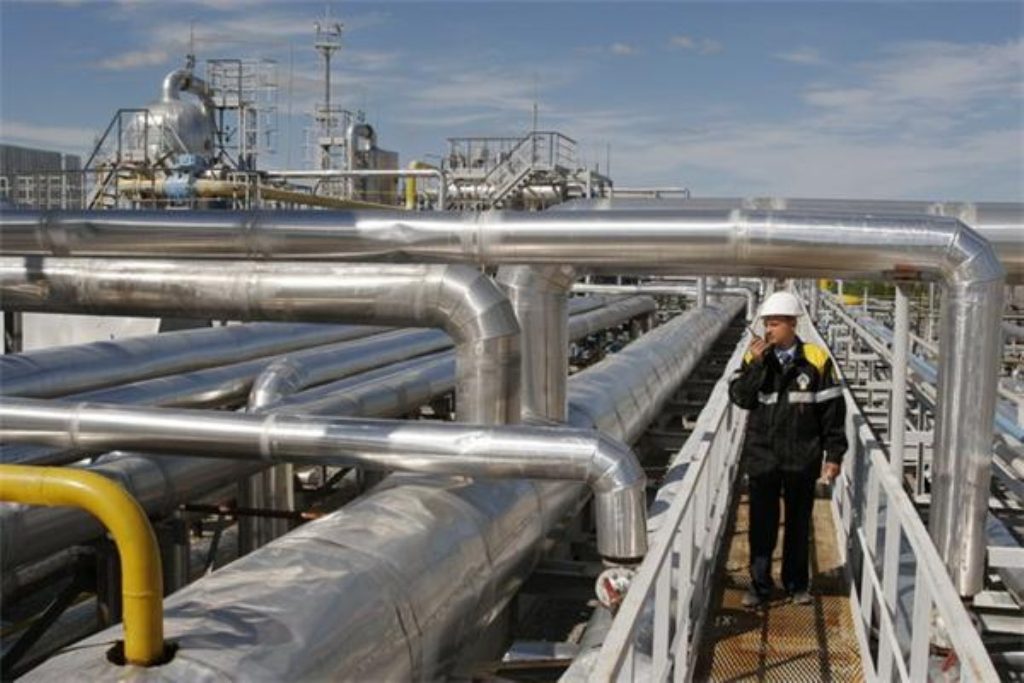How a Cold War with Russia could save the environment
European politicians are getting lots of practice at sticking two fingers up at Russia. Now the IPPR thinktank has come up with an innovative new way of hitting the Kremlin where it really hurts: by stripping away the EU's reliance on Russian gas.
It sounds far-fetched. Over half of Europe's energy is now imported, after all, including two-thirds of its gas. All but four of the EU's 28 member states import gas from Russia, while six of them rely on Moscow's goodwill for 100% of their gas. Could the European Union really find a way of ending its reliance on its eastern pipelines?
"It is both the cheapest means of cutting carbon output, and essential for improving European energy security," says Joss Garman, the author of IPPR's report on energy security published this week. He's talking about the need for the EU setting an energy efficiency target for 2030. Doing so, Garman believes, would save 500 billion euros over the next 15 years. It would more than pay for the extra costs of switching to renewable sources of energy. And it would cut Europe's gas dependency by a third – the exact proportion of the EU's demand met by imports from Russia.
Energy efficiency looks like a more attractive option than the alternatives. Diversifying gas supply looks like being costly. Coal is as polluting as it ever was. Renewables are the future, but will take time to be really affordable. That only really leaves two options: energy efficiency and fracking.


In Britain, which relies on Russia for 15% of its gas imports, ministers are pursuing both. Shale gas industry types think fracking could boost Britain's gas supply by as much as 18%. But this assumes there isn't any more progress on cutting emissions or boosting renewables. When you count those – as the International Energy Agency has done – the most optimistic number for shale is ten per cent. Still, it's enough to get Conservative ministers all patriotic about their duty to get more fossil fuels out of the ground. It would be irresponsible not to, they argue; and anyway, shale is a lot greener than other hydrocarbons.
What this forgets is that fracking releases fossil fuels from the ground that green campaigners would really rather stay there for good. They already think we're on a knife-edge in terms of avoiding the catastrophic consequences which global warming of above 2C by 2100 would bring. So green campaigners marshalling the conservative forces of nimbyism to oppose exploratory drilling across Britain have a clear goal. "Corporations are really scared of the idea that renewables will come down in price," Hannah Martin of Say No To Gas says. "We need to halt the fracking industry to the extent that allows renewables to be competitive." Five years, they think, ought to about do it.
The problem is Labour isn't going to help them by putting up much of a fight in Westminster. Shadow energy minister Tom Greatrex is well aware that the last decade has seen Britain's North Sea gas deplete to the extent that Britain is now a net importer, not exporter. So he says his party doesn't have an "absolutist" opposition to gas. "I remain sceptical about how much of a role it will end playing," he says. "But if there is potential there the first step is to ensure the regulation is robust."
Labour has tabled amendments to the infrastructure bill, offering support in return for tightened rules. It wants the fracking industry's code of practice to go on the statute book. Right now the government is resisting accepting this; one Department for Energy and Climate Change (Decc) source insisted the amendment was "pointless". But ministers are probably right to downplay these finer points of detail. Consensus has been all but achieved on fracking.
It may not matter all that much. Garman's IPPR report suggests shale gas' contribution across the whole of Europe will only be "marginal" at best. His bright idea is a 35% reduction in emissions achieved through energy efficiency by 2030.

But this is problematic. The EU is struggling to agree on targets for cutting carbon emissions and boosting renewable energy by 2030 as it is; it was supposed to settle the numbers in March, and its revised timetable of October now looks like it might slip because of haggling over the European commissioner appointments. Adding an energy efficiency target to the mix is difficult, although it is supported by some EU nations. Still, it's not impossible. And it would be nice, Garman suggests, if the UK were to back such a move. "Britain should overcome its aversion to an energy efficiency target as part of its broader response to Russian aggression," he suggests.
There's a further reason for European unity, too. The next big climate change conference, taking place in Paris in December 2015, is now just over a year away. With America and China embracing clean energy policies, an international agreement is possible; but the European Union will need to present a united front if meaningful change is to be achieved. Finding ways of safeguarding Europe from Russia is one thing. Saving the planet is quite another.

